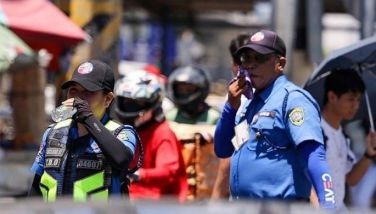AIDS killed 500,000 in Asia in 2003
December 28, 2003 | 12:00am
Acquired Immune Deficiency Syndrome (AIDS) claimed the lives of 500,000 people in the Asia-Pacific region alone in 2003, the World Health Organization (WHO) has reported.
This figure translates into one death from AIDS per minute.
The WHO has warned that unless governments invest in AIDS prevention and care, "similar death tolls can be expected until the end of the decade."
Citing the report "HIV/AIDS and the Pacific Region 2003," the WHO noted that of the 40 million AIDS cases worldwide, Asia and the Pacific account for seven million people living with the Human Immunodeficiency Virus (HIV) that causes AIDS.
"India has the highest number of people in ASIA living with HIV/AIDS, an estimated 3.8 million to 4.6 million people," the world health body said. "China accounts for about 840,000 HIV infections. The report highlights alarming rates of infections among some populations in China: in Xinjiang province, for example, 80 percent of injecting drug users are infected."
The WHO also observed "high infection rates" in Myanmar, Papua New Guinea, Cambodia and Thailand.
Cambodia has the highest estimated HIV/AIDS prevalence rate in the region, at 2.6 percent prevalence among its general population.
The WHO also said HIV infection rates in Vietnam are pegged at over 20 percent among injecting drug users. "Disturbingly, the high rates of HIV infection among sex workers previously noted in the south (of Vietnam) have now been found in the north," the WHO said. According to the WHO, "15 percent of sex workers in Hanoi are estimated to be HIV-positive."
But there is a glimmer of hope. The WHO found out that while HIV prevalence is increasing in countries like China, Indonesia, Papua New Guinea and Vietnam, "there is also clear evidence of success in tackling the epidemic in some of the countries with the highest prevalence."
The WHO cited Thailand as an example of what government can do to stem the tide of HIV infections. Thailand’s HIV infection rate among sex workers peaked in the mid-1990s. The WHO also recognized the efforts of Cambodia and Myanmar to reduce the HIV risk to sex workers.
The WHO observed that "in contrast to the relative success of measures targeted at limiting HIV transmission via commercial sex, HIV epidemics among injecting drug users continue unabated in many countries.
The countries that experienced surges in HIV transmission among injecting drug users include China, India, Malaysia, Pakistan, Myanmar, Thailand, Vietnam and, most recently, Indonesia and Nepal.
"The WHO report argues that the considerable success in reducing HIV among sex workers in these countries, through preventive measures such as condom promotion, for example, must be replicated in other groups," the organization added.
The WHO maintained that governments need to take action to control HIV infection through injecting drug use and high-risk sexual behavior and "to scale up successful small-scale projects so that they have a nationwide impact."
The AIDS virus is transmitted through the exchange of body fluids via unprotected sex, sharing of contaminated hypodermic needles among injecting drug users, contaminated blood and from an infected mother to her unborn child.
The virus attacks the human immune system, laying waste to the body’s defenses and making it vulnerable to illness. Once the HIV has destroyed the body’s immune system, persons infected with the virus die of opportunistic infections such as pneumonia and other infections that could otherwise be easily cured with conventional drugs.
People most at risk of HIV infection are sex workers, injecting drug users, people who engage in unprotected sex with multiple partners and those who regularly have blood transfusions, such as hemophiliacs.
While the risk of being infected with the AIDS virus is greater for such people, the risks can be diminished by condom use, not sharing hypodermic needles, monogamy or abstinence from sex, delaying sexual activity and ensuring that blood used for transfusions is obtained from licensed blood banks that screen donors and donated blood before distributing it.
This figure translates into one death from AIDS per minute.
The WHO has warned that unless governments invest in AIDS prevention and care, "similar death tolls can be expected until the end of the decade."
Citing the report "HIV/AIDS and the Pacific Region 2003," the WHO noted that of the 40 million AIDS cases worldwide, Asia and the Pacific account for seven million people living with the Human Immunodeficiency Virus (HIV) that causes AIDS.
"India has the highest number of people in ASIA living with HIV/AIDS, an estimated 3.8 million to 4.6 million people," the world health body said. "China accounts for about 840,000 HIV infections. The report highlights alarming rates of infections among some populations in China: in Xinjiang province, for example, 80 percent of injecting drug users are infected."
The WHO also observed "high infection rates" in Myanmar, Papua New Guinea, Cambodia and Thailand.
Cambodia has the highest estimated HIV/AIDS prevalence rate in the region, at 2.6 percent prevalence among its general population.
The WHO also said HIV infection rates in Vietnam are pegged at over 20 percent among injecting drug users. "Disturbingly, the high rates of HIV infection among sex workers previously noted in the south (of Vietnam) have now been found in the north," the WHO said. According to the WHO, "15 percent of sex workers in Hanoi are estimated to be HIV-positive."
But there is a glimmer of hope. The WHO found out that while HIV prevalence is increasing in countries like China, Indonesia, Papua New Guinea and Vietnam, "there is also clear evidence of success in tackling the epidemic in some of the countries with the highest prevalence."
The WHO cited Thailand as an example of what government can do to stem the tide of HIV infections. Thailand’s HIV infection rate among sex workers peaked in the mid-1990s. The WHO also recognized the efforts of Cambodia and Myanmar to reduce the HIV risk to sex workers.
The WHO observed that "in contrast to the relative success of measures targeted at limiting HIV transmission via commercial sex, HIV epidemics among injecting drug users continue unabated in many countries.
The countries that experienced surges in HIV transmission among injecting drug users include China, India, Malaysia, Pakistan, Myanmar, Thailand, Vietnam and, most recently, Indonesia and Nepal.
"The WHO report argues that the considerable success in reducing HIV among sex workers in these countries, through preventive measures such as condom promotion, for example, must be replicated in other groups," the organization added.
The WHO maintained that governments need to take action to control HIV infection through injecting drug use and high-risk sexual behavior and "to scale up successful small-scale projects so that they have a nationwide impact."
The AIDS virus is transmitted through the exchange of body fluids via unprotected sex, sharing of contaminated hypodermic needles among injecting drug users, contaminated blood and from an infected mother to her unborn child.
The virus attacks the human immune system, laying waste to the body’s defenses and making it vulnerable to illness. Once the HIV has destroyed the body’s immune system, persons infected with the virus die of opportunistic infections such as pneumonia and other infections that could otherwise be easily cured with conventional drugs.
People most at risk of HIV infection are sex workers, injecting drug users, people who engage in unprotected sex with multiple partners and those who regularly have blood transfusions, such as hemophiliacs.
While the risk of being infected with the AIDS virus is greater for such people, the risks can be diminished by condom use, not sharing hypodermic needles, monogamy or abstinence from sex, delaying sexual activity and ensuring that blood used for transfusions is obtained from licensed blood banks that screen donors and donated blood before distributing it.
BrandSpace Articles
<
>
- Latest
- Trending
Trending
Latest
Trending
Latest
Recommended


































